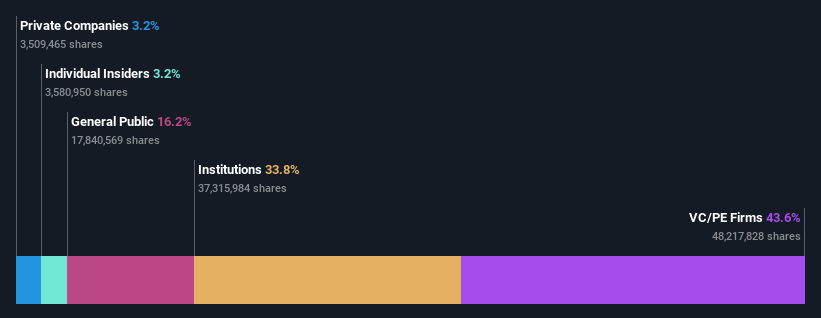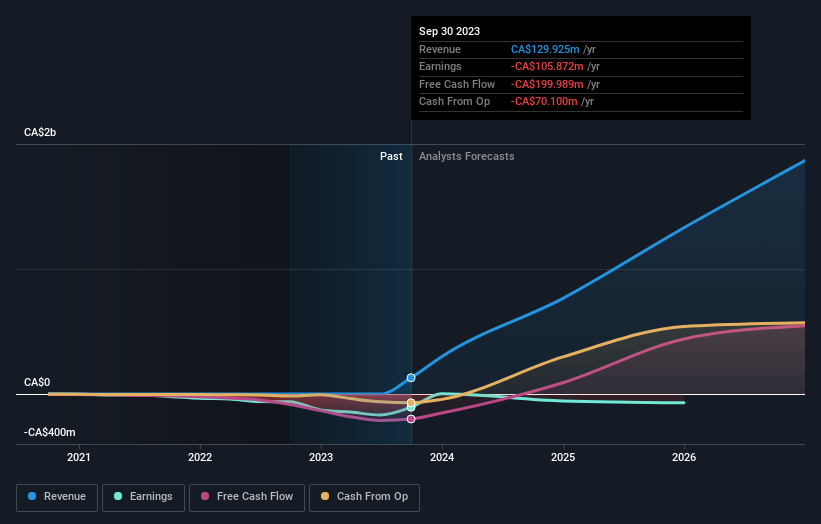Key Insights
- The considerable ownership by private equity firms in Sigma Lithium indicates that they collectively have a greater say in management and business strategy
- The top 3 shareholders own 53% of the company
- Institutions own 34% of Sigma Lithium
Every investor in Sigma Lithium Corporation (NASDAQ:SGML) should be aware of the most powerful shareholder groups. And the group that holds the biggest piece of the pie are private equity firms with 44% ownership. That is, the group stands to benefit the most if the stock rises (or lose the most if there is a downturn).
While institutions, who own 34% shares weren’t spared from last week’s US$211m market cap drop, private equity firms as a group suffered the maximum losses
In the chart below, we zoom in on the different ownership groups of Sigma Lithium.
See our latest analysis for Sigma Lithium

What Does The Institutional Ownership Tell Us About Sigma Lithium?
Many institutions measure their performance against an index that approximates the local market. So they usually pay more attention to companies that are included in major indices.
As you can see, institutional investors have a fair amount of stake in Sigma Lithium. This can indicate that the company has a certain degree of credibility in the investment community. However, it is best to be wary of relying on the supposed validation that comes with institutional investors. They too, get it wrong sometimes. If multiple institutions change their view on a stock at the same time, you could see the share price drop fast. It’s therefore worth looking at Sigma Lithium’s earnings history below. Of course, the future is what really matters.

Sigma Lithium is not owned by hedge funds. The company’s largest shareholder is A10 Investimentos Ltda., with ownership of 44%. Meanwhile, the second and third largest shareholders, hold 4.9% and 4.8%, of the shares outstanding, respectively.
After doing some more digging, we found that the top 3 shareholders collectively control more than half of the company’s shares, implying that they have considerable power to influence the company’s decisions.
Researching institutional ownership is a good way to gauge and filter a stock’s expected performance. The same can be achieved by studying analyst sentiments. Quite a few analysts cover the stock, so you could look into forecast growth quite easily.
Insider Ownership Of Sigma Lithium
While the precise definition of an insider can be subjective, almost everyone considers board members to be insiders. Management ultimately answers to the board. However, it is not uncommon for managers to be executive board members, especially if they are a founder or the CEO.
I generally consider insider ownership to be a good thing. However, on some occasions it makes it more difficult for other shareholders to hold the board accountable for decisions.
We can see that insiders own shares in Sigma Lithium Corporation. This is a big company, so it is good to see this level of alignment. Insiders own US$45m worth of shares (at current prices). If you would like to explore the question of insider alignment, you can click here to see if insiders have been buying or selling.
General Public Ownership
With a 16% ownership, the general public, mostly comprising of individual investors, have some degree of sway over Sigma Lithium. This size of ownership, while considerable, may not be enough to change company policy if the decision is not in sync with other large shareholders.
Private Equity Ownership
With a stake of 44%, private equity firms could influence the Sigma Lithium board. Sometimes we see private equity stick around for the long term, but generally speaking they have a shorter investment horizon and — as the name suggests — don’t invest in public companies much. After some time they may look to sell and redeploy capital elsewhere.
Private Company Ownership
We can see that Private Companies own 3.2%, of the shares on issue. Private companies may be related parties. Sometimes insiders have an interest in a public company through a holding in a private company, rather than in their own capacity as an individual. While it’s hard to draw any broad stroke conclusions, it is worth noting as an area for further research.
Next Steps:
While it is well worth considering the different groups that own a company, there are other factors that are even more important. For instance, we’ve identified 5 warning signs for Sigma Lithium (1 shouldn’t be ignored) that you should be aware of.
If you are like me, you may want to think about whether this company will grow or shrink. Luckily, you can check this free report showing analyst forecasts for its future.
NB: Figures in this article are calculated using data from the last twelve months, which refer to the 12-month period ending on the last date of the month the financial statement is dated. This may not be consistent with full year annual report figures.
Valuation is complex, but we’re helping make it simple.
Find out whether Sigma Lithium is potentially over or undervalued by checking out our comprehensive analysis, which includes fair value estimates, risks and warnings, dividends, insider transactions and financial health.
Have feedback on this article? Concerned about the content? Get in touch with us directly. Alternatively, email editorial-team (at) simplywallst.com.
This article by Simply Wall St is general in nature. We provide commentary based on historical data and analyst forecasts only using an unbiased methodology and our articles are not intended to be financial advice. It does not constitute a recommendation to buy or sell any stock, and does not take account of your objectives, or your financial situation. We aim to bring you long-term focused analysis driven by fundamental data. Note that our analysis may not factor in the latest price-sensitive company announcements or qualitative material. Simply Wall St has no position in any stocks mentioned.




